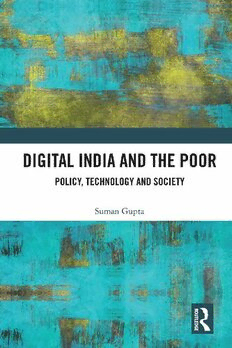
Digital India and the Poor: Policy, Technology and Society PDF
Preview Digital India and the Poor: Policy, Technology and Society
Digital India and the Poor Digital India and the Poor examines how the poor are evoked in contemporary Indian political discourse. It studies the ways in which the disadvantaged are accounted for in the increasingly digitised political economy, commercial and public policy, media, and academic research. This book: • Investigates the category of the poor in India and how they have come to be classified in economic and policy documents over the past few decades • Explores the influential digital education technology ‘experiments’ conducted in Indian slums in the early 2000s, now popularly known as the ‘hole- in- the- wall experiments’ • Discusses financial inclusion initiatives, predominantly as they converged between 2014 and 2017, such as the Jan Dhan Yojana, the Aadhaar Project, and the banknote demonetisation • Presents an in-d epth study of the bearing of technology on domestic employment in India The book will be of great interest to scholars and researchers of South Asian studies, politics, political science and sociology, technology studies, linguistics, and development studies. Suman Gupta is Professor of Literature and Cultural History at the Open University, UK. He has held visiting positions at Delhi University, India; Peking University, China; University of Texas Austin, USA; Federal University of Campinas, Brazil, among others. He is Honorary Senior Research Fellow at Roehampton University, UK. He has authored various publications including Usurping Suicide: The Political Resonances of Individual Deaths (2017, co- author), Consumable Texts in Contemporary India: Uncultured Books and Bibliographical Sociology (2015), Globalization and Literature (2009), and The Theory and Reality of Democracy: A Case Study in Iraq (2006). Digital India and the Poor Policy, Technology and Society Suman Gupta First published 2020 by Routledge 2 Park Square, Milton Park, Abingdon, Oxon OX14 4RN and by Routledge 52 Vanderbilt Avenue, New York, NY 10017 Routledge is an imprint of the Taylor & Francis Group, an informa business © 2020 Suman Gupta The right of Suman Gupta to be identified as author of this work has been asserted by him in accordance with sections 77 and 78 of the Copyright, Designs and Patents Act 1988. All rights reserved. No part of this book may be reprinted or reproduced or utilised in any form or by any electronic, mechanical, or other means, now known or hereafter invented, including photocopying and recording, or in any information storage or retrieval system, without permission in writing from the publishers. Trademark notice: Product or corporate names may be trademarks or registered trademarks, and are used only for identification and explanation without intent to infringe. British Library Cataloguing- in- Publication Data A catalogue record for this book is available from the British Library Library of Congress Cataloging- in- Publication Data A catalog record for this book has been requested ISBN: 978- 0- 367- 43894- 4 (hbk) ISBN: 978- 1- 003- 01024- 1 (ebk) Typeset in Sabon by Apex CoVantage, LLC For Bhola, Dhiren and Fuleshwar Contents List of tables viii Acknowledgements ix 1 Introduction: theme, method, terms, structure 1 PART I Top- down 17 2 Experiments in slums, 1999–2006 19 3 From ‘informal sector’ to ‘financial inclusion’, 2004–14 54 4 ‘Financial inclusion’ initiatives, 2014–17 80 PART II On the ground 119 5 Domestic workers and the performance of hierarchy 121 6 Domestic workers and technology 143 7 Conclusion: slippages 176 Index 186 Tables 3.1 Main workers, marginal workers, non- workers and seeking work, age 15–59 66 3.2 Literate and illiterate, age 15–59 66 3.3 Education-l evel, without education level/below primary/ primary, age 15–59 67 3.4 Number of MSMEs and numbers employed, 2012–13 and 2013–14 68 3.5 Income tax returns, all taxpayers, 2014–15 68 4.1 Network underpinning ‘financial inclusion’ initiatives in India, especially 2014–17 108 6.1 Work conditions for placement- agency and non- placement- agency domestic workers 165 Acknowledgements For a project such as this, the researcher needs space and time, amenable facilities and access to sources. The Open University, where I am employed, has generously provided all these and more. I am extremely fortunate in my colleagues. They have developed the excellent habit of overlooking my shortcomings and evincing interest in my pursuits. I have come to regard the campus of Roehampton University, where I have been an honorary fellow for a considerable period, as an extension of my home. None there have let me feel otherwise than at home. Frequent visits to Delhi have played their part in the writing of this book. I have plied strangers and acquaintances with questions, filled the (some- times reluctant) ears of friends and relatives, been an interloper at various events and conferences, pestered librarians and bookshop keepers. To name a few would be to do a disservice to the others; that I still don’t know the names of some or have just about crossed paths with others doesn’t mean that I am any less indebted to them. Thanks are due to Aakash Chakrabarty of Routledge India for taking this book towards publication. Cheng’s scepticism and Ayan-Y ue’s doubts about my ideas keep my research moving. For any errors found in this book, I am to blame. Suman Gupta September 2019
